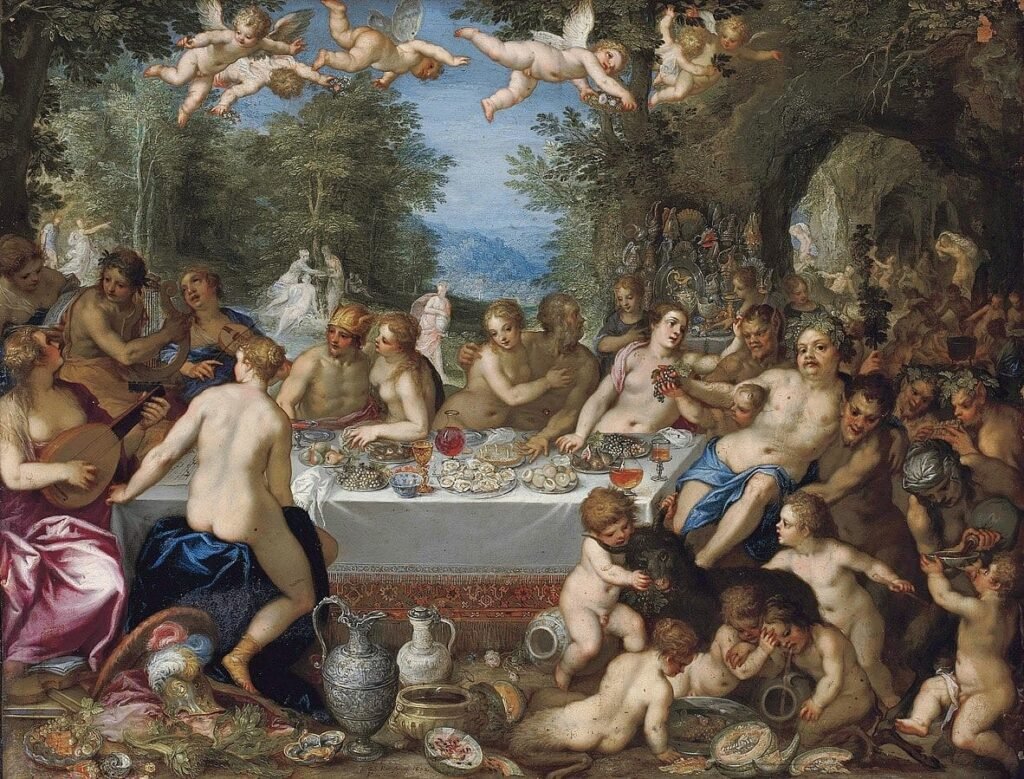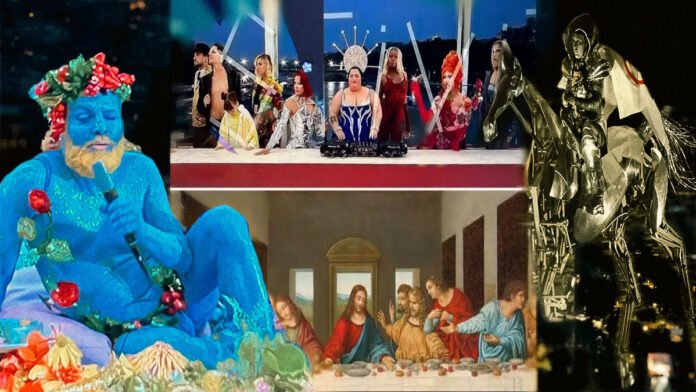A Blasphemous Burlesque: Paris Olympics
When you think you’ve seen it all, up pops the next shocker – The Paris Opening Ceremony – a spectacle that managed to outdo even the wildest fever dreams of a Dante’s Inferno on acid. Let’s not mince words here, comrades. This wasn’t just an opening ceremony; it was a full-frontal assault on good taste, common sense, and apparently, the sensibilities of anyone who doesn’t think “blasphemous burlesque” is an appropriate theme for a global sporting event.
Now, before the liberal elite start screeching about “right-wing pearl-clutching,” let’s get one thing straight: this isn’t about prudishness or religious fervour. It’s about the sheer absurdity of turning what should be a celebration of athletic achievement into a carnival of controversy.
The organisers, in their infinite wisdom, decided to serve up a buffet of symbolism so heavy-handed it would make Salvador Dali question his own subtlety. We had Pale Riders walking on water (because nothing says “Olympic spirit” quite like the Four Horsemen of the Apocalypse), a transgender Last Supper (complete with an uncomfortable-looking child, because why not?), and a semi-naked blue Smurf masquerading as Bacchus. It’s as if they were playing “Offend Bingo” and aiming for a full house.
At the heart of the controversy lies a series of performances that pushed the boundaries of taste and cultural sensitivity. The ceremony’s organisers, in their apparent zeal to present a progressive and avant-garde face of France, seem to have overlooked the global nature of their audience and the diverse cultural sensibilities of the Olympic community.
The most contentious element was undoubtedly the reimagining of Leonardo da Vinci’s “The Last Supper” with drag queens and transgender models. This artistic choice, while perhaps intended as a bold statement on inclusivity, struck many viewers as a deliberate provocation against Christian beliefs. The inclusion of a visibly uncomfortable child in this tableau only added to the unsettling nature of the scene.
Of course, we’re now told this was merely an “interpretation” of The Feast of the Gods, the marriage of Bacchus and Ariadne. How convenient. It’s as if the organisers, caught with their hands in the blasphemy jar, suddenly remembered their Art History 101 and decided to retroactively apply some classical veneer to their shock-jock theatrics.
Let’s not kid ourselves, comrades. The choreography was about as subtle as a sledgehammer to the face. The positioning of the characters was a clear nod to Leonardo da Vinci’s Last Supper, right down to the halo adorning the central figure’s head. It doesn’t take a theologian to connect these dots.
This post-hoc justification is nothing more than a flimsy attempt to dodge the controversy they so eagerly courted. It’s the cultural equivalent of a child caught with their hand in the cookie jar, insisting they were just “cleaning” it. The organisers wanted to provoke, to shock, to generate buzz – and now they’re scrambling to clothe their naked emperor in the respectable robes of classical mythology.
But here’s the rub: even if we accept this feeble excuse at face value, it doesn’t make the spectacle any less inappropriate for a global sporting event. Replacing Christian iconography with pagan debauchery doesn’t suddenly make it a unifying, uplifting experience suitable for an Olympics opening ceremony.
This whole debacle reeks of the worst kind of pseudo-intellectual posturing. It’s the sort of “art” that mistakes controversy for depth, shock for substance. And in doing so, it manages to alienate and offend a broad swath of people – not just the religious, but anyone who expects a bit more from a ceremony meant to bring the world together.
In the end, whether it’s the Last Supper or the Feast of Bacchus, the result is the same: a divisive, self-indulgent display that has no place in what should be a celebration of athletic achievement and international cooperation. But I suppose in today’s climate, that’s asking too much. After all, why unite when you can provoke?

France’s proud tradition of secularism and its penchant for challenging religious sensibilities through art is well-documented. However, there’s a time and place for everything, and one must question whether an event meant to unite nations through sport was the appropriate venue for such a provocative display. The Catholic Church in France certainly didn’t think so, expressing deep regret over what they saw as mockery of their faith.
The Church rightfully criticised these segments, the Conference of French bishops said in a statement: “This ceremony has unfortunately included scenes of derision and mockery of Christianity, which we very deeply deplore”.
While France indeed has a strong tradition of secularism and values freedom of expression, including the right to satirise religion, the Olympic Games are meant to be a unifying global event that transcends cultural and religious differences.
This misstep in cultural sensitivity highlights a growing disconnect between certain progressive artistic circles and the broader global audience. The organisers seem to have conflated shock value with artistic merit, forgetting that the Olympics are meant to celebrate athletic achievement and international cooperation, not serve as a platform for controversial social commentary.
Further adding to the controversy was the portrayal of Dionysus/Bacchus, the Greek-Roman god of wine, represented by a nude performer. This imagery, combined with the overall tone of excess and decadence, evoked comparisons to Sodom and Gomorrah, fuelling conspiracy theories and religious objections.
Moreover, the ceremony’s focus on decadence and excess feels particularly tone-deaf in a world grappling with economic uncertainties, environmental challenges, and social inequalities.
The Marie Antoinette reference, with its haunting image of a headless woman singing from the windows of the Conciergerie – a nod to the decadence and excess that brought about a revolution overthrowing the French monarchy and ruling class was a powerful moment could have set the stage for a thoughtful reflection on excess and its consequences in a world of inequality.
However, the subsequent displays of opulence and indulgence – this Olympic opening embraced was about promoting decadence and debauchery as if it was the aim of France’s cultural revolution not the cause of it. The irony was apparently lost on the producers, who seemed to think that the best way to critique opulence was to… indulge in it. It’s like trying to criticise gluttony by hosting an all-you-can-eat buffet.
Now, the liberal chattering classes will no doubt defend this as “art” and “freedom of expression.” And yes, freedom of expression is indeed a cornerstone of democracy. But let’s not confuse the right to express oneself with the wisdom of doing so on a global stage meant to unite nations through sport.
It’s easy to dismiss the backlash as another skirmish in the ongoing culture wars, amplified by the echo chambers of social media. However, this oversimplification ignores the genuine discomfort felt across the political spectrum. Many on the left, myself included, found the spectacle distasteful and alienating. It’s a reminder that socialism, with its roots in collective struggle against oppression, is not synonymous with the individualistic excesses often associated with extreme liberalism.
This brings us to a crucial point: the yawning chasm between socialism and liberalism that so many seem to forget. Socialism, at its core, is about collective struggle against oppression, about lifting up the working class. Liberalism, on the other hand, especially in its modern incarnation, seems more concerned with individual self-expression taken to extremes.
One fights against excess and debauchery; the other celebrates it as a form of “liberation.” One seeks to unite the working class; the other divides us into ever-smaller identity groups, each vying for the title of Most Oppressed.
The organisers of this Olympic opening ceremony seem to have embraced the worst excesses of modern ultra-liberalism, confusing shock value with meaningful commentary. They’ve managed to alienate not just the right wing, but many on the left as well – those of us who still believe in the power of collective action and solidarity, rather than individualistic displays of “transgression.”
In their eagerness to make a statement, the organisers may have forgotten the primary purpose of the Olympic Games – to celebrate human physical achievement and foster international goodwill. Instead, they delivered a confusing mishmash of provocative imagery that seemed more intent on shocking than inspiring.
In the end, what we’re left with is a ceremony that will be remembered not for its artistic merit or unifying message, but for its sheer, unadulterated ability to provoke. It’s a sad state of affairs when the opening of the world’s premier sporting event becomes indistinguishable from a late-night cabaret show in the seedier parts of Montmartre.
Support Independent Journalism Today
Our unwavering dedication is to provide you with unbiased news, diverse perspectives, and insightful opinions. We're on a mission to ensure that those in positions of power are held accountable for their actions, but we can't do it alone. Labour Heartlands is primarily funded by me, Paul Knaggs, and by the generous contributions of readers like you. Your donations keep us going and help us uphold the principles of independent journalism. Join us in our quest for truth, transparency, and accountability – donate today and be a part of our mission!
Like everyone else, we're facing challenges, and we need your help to stay online and continue providing crucial journalism. Every contribution, no matter how small, goes a long way in helping us thrive. By becoming one of our donors, you become a vital part of our mission to uncover the truth and uphold the values of democracy.
While we maintain our independence from political affiliations, we stand united against corruption, injustice, and the erosion of free speech, truth, and democracy. We believe in the power of accurate information in a democracy, and we consider facts non-negotiable.
Your support, no matter the amount, can make a significant impact. Together, we can make a difference and continue our journey toward a more informed and just society.
Thank you for supporting Labour Heartlands









